Imagine this: first morning – summer in Lisbon, bright and early. You head out to see the enchanting São Jorge Castle.
In your head, you’re picturing pristine sunrise views, long moments of silence and contemplation, and the creation of sentimental memories that will never fade.
Just as the castle comes into view however, something else also comes into view: a loud American dad in a bucket hat. He’s got a white blob of sunscreen on his nose and his noisy family are trailing him like a flock of honking geese.
Conveniently, just to add to your vexed state, there’s a solid mass of tourists covering every square foot of ground between you and the castle—even though you got here early!
If this sounds like a nightmare situation to you, then cheer up; you’re in the right place.
Portugal is a gorgeous place with bags of potential, BUT, it is becoming more and more touristy every time I go. So, planning your trip to ensure you miss the crowds AND get the best weather is essential.
I’ll cover everything about the best time to travel to Portugal in this post so you can travel in peace and return home with precious, unspoiled memories.

Photo: @joemiddlehurst
- Best time to visit Portugal – May and June, September and October
- Best time to go to Lisbon – April and May, November and October
- Best time to go to Porto – May, June, and September
- Best time to go to the Algarve – Summer (June, July, and August)
- Best time for sightseeing – Summer (May, June, July, August) and Autumn (September, October)
- Cheapest time to visit Portugal – Winter (November, December, January, February, March)
- When is the Best Time to Visit Portugal?
- When is the Cheapest Time to Visit Portugal?
- When to Visit Portugal – Weather by Month
- Best Time to Visit Portugal by Place
- Best Time to Visit Portugal for Parties and Festivals
- FAQs About the Best Time to Visit Portugal
- Final Thoughts on the Best Time to Visit Portugal
When is the Best Time to Visit Portugal?
Answering this question in an absolute sense is tough. Why?
Because everyone wants different things from their travels. I would have two very different answers to this question depending on whether you’re travelling to Portugal to surf in Madeira vs to go trekking in the north.
So, my advice is to know your travel priorities. What are looking to do with your time in Portugal? Once you know what you’re looking for, you can choose a time of year best suited to you and your needs.

Photo: @amandaadraper
However, I can say that May–June and September–October are, in general, the best pockets of the year to visit Portugal. This is because you’ll be skipping out on July and August, which are the really heavy tourist months (and honestly, they’re slightly too hot anyway). So you’ll get nearly perfect weather but without the hordes of tourists.
To get more specific, though, June–August is the best time for the southern Algarve region, where most of Portugal’s best beaches are. This is the high season for most of Portugal, so the ocean will be crowded. But if you want that perfect beach weather, there’s simply no way around this. It’s the high season for a reason – because it is, on paper, the best time to visit.
The winter months (November–March) are ideal if you want the smallest crowds and the lowest prices. But keep in mind that if you visit during this season, you’ll have to be okay with jacket weather and occasional rain (especially in the north).
Regardless of when or where you choose to stay in Portugal, booking your stay EARLY is the best way to ensure you get the best deals and options for your accommodation.
When is the Cheapest Time to Visit Portugal?
For the budget-savvy traveller, the off-season winter months of November–March is where it’s at. Now, there’s a reason why this is the off-season: the weather is mildly cold and rainy, and you can’t assume every attraction will be open to visitors.

Photo: @joemiddlehurst
The good news is that prices really are quite cheap. Even regardless of high and low seasons, Portugal is renowned for being the cheapest overall country in all of Western Europe.
The cost of living in Portugal is perfect for budget backpackers – many locals live here for less than $1,000 per month! So it goes without saying that you’ll be able to find some pretty sweet deals on accommodation, especially if you book in advance and if you’re patient in waiting for discounts.
It’s important to remember that, even during the off-season, prices do fluctuate in response to Christmas, New Year’s, and other famous Portuguese cultural festivals.
When to Visit Portugal – Weather by Month
At this point, you’ve probably already made up your mind about when you want to visit Portugal. But if you’re especially indecisive (like I can be!), see below for a detailed breakdown of each month.
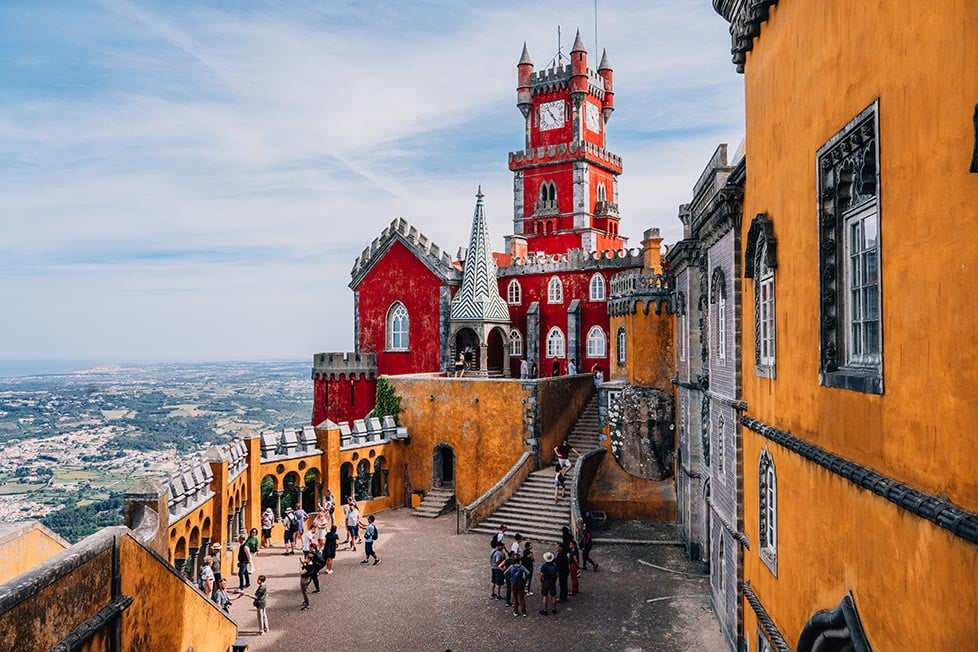
Image: Nic Hilditch-Short
I use the Met Office website to check how the weather will be year-round, and it’s a great tool for doing your own research. Remember that this article covers all of Portugal, so the averages I give are bound to change as you move north (colder) or south (warmer) through the country.
January in Portugal
- Average Max. Temperature: 13.7°C, 56.7°F
- Rainfall: 7 days
On average, January is Portugal’s coldest month. That said, “cold” here doesn’t carry the same connotations that it does in, say, Germany, for example. It never snows in Portugal unless you’re way up in the North, at high elevations.
Aside from an apparent spike around New Year’s, both prices and crowds will be at rock bottom in January. But this also means that you shouldn’t expect every attraction to be open to visitors.
There’s always a huge winter sale in Portugal that starts after Christmas and goes till the middle of February. So if you need some new clothes, now’s the time!
February in Portugal
- Average Max. Temperature: 14.4°C, 57.9°F
- Rainfall: 6 days
The weather in February is only slightly warmer than it is in January, though it rains a bit less. You’ll need a decent outdoor jacket most of the time, no matter where you are in the country.
For the most part, prices are still low, and crowds are small in February. However, this changes at the end of the month, when the entire country celebrates what is perhaps the largest cultural festival in the country: Carnaval.
March in Portugal
- Average Max. Temperature: 16.5°C, 61.6°F
- Rainfall: 6 days
March in Portugal is when you can finally start to feel spring in the air! You’ll finally be able to rip off that jacket during the many clear, sunny days. In the north, it’s still pretty cold and rainy.
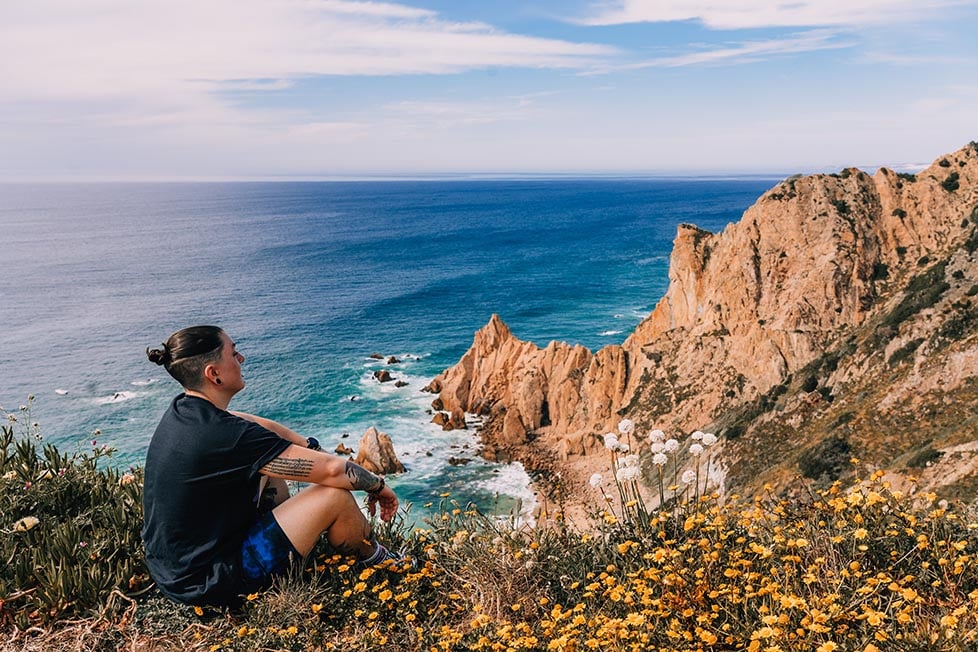
Photo: Nic Hilditch-Short
Even though things are starting to warm up in the south, you’ll still find minimal tourists and relatively low prices, making this a great time for budget travellers to visit Portugal—that is, unless it’s the end of March, during Semana Santa. Portugal does not mess around on Holy Week!
April in Portugal
- Average Max. Temperature: 18.3°C, 64.9°F
- Rainfall: 7 days
Spring is in full force in Portugal during the month of April. Though it rains a significant amount, temperatures are really starting to get comfortable, even up in the north around Porto.
April is when the first of the tourists start to trickle in. In areas like Lisbon, Porto, and Sintra, activity starts picking up, and prices begin to rise toward their high season peaks. But in some of the more off-the-beaten-path places, it can still be considered low season.
Easter in Portugal is usually in April, but sometimes it falls at the very end of March. It’s a very important and holy time of year for most of the locals, which makes it a really fun (but also more expensive) time to visit.
May in Portugal
- Average Max. Temperature: 21.1°C, 70°F
- Rainfall: 5 days
May is truly one of the best times to visit Portugal. The weather is sunny and starting to get comfortably warm, making it perfect for any and all outdoor activities, whether in the north or the south.
Believe it or not, the crowds are still somewhat thin in May, with Lisbon, the Algarve, and Porto seeing most of the action. May is an utterly perfect blend of excellent weather, low tourist counts, and mid-level prices; that’s why I have it listed as one of the best times to visit Portugal.
The Iberian Mask Festival kicks off during the first week of May… and it’s a festival quite unlike any you’ve probably seen before.
June in Portugal
- Average Max. Temperature: 24.3°C, 75.7°F
- Rainfall: 2 days
This is peak Portugal weather. It’s sunny and warm almost all the time, and there are virtually no rainy days. Those fabulous Portuguese beaches, mountains, and everything in between are more than accessible. This alone makes June one of the best months to visit Portugal!
The first real wave of tourists tends to arrive after the 15th of the month, so if you visit Portugal in early June, you shouldn’t be too overwhelmed. Of course, prices are starting to spike up here, so it’s not a great time to visit if saving every penny is important to you.
There’s tonsssss going on in Portugal in June, but one event you won’t want to miss is the unique NOS Primavera Sound festival in Porto.
July in Portugal
- Average Max. Temperature: 25.9°C, 78.7°F
- Rainfall: 1 day
Portugal in July is just like Portugal in June, only a bit hotter (some might say too hot). If you’re a beach bum though, seize the day!
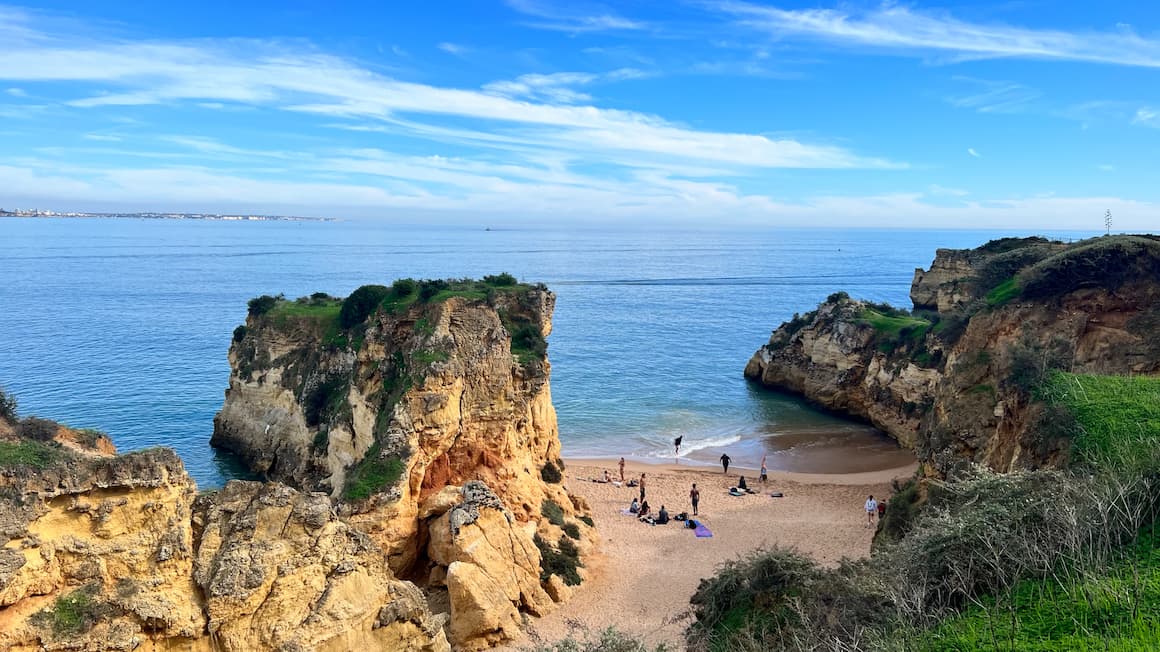
Photo: @amandaadraper
As far as crowds go, visit Portugal in July at your own risk… just kidding. It’s not that bad. But don’t expect to wait in line for any of the major attractions without constant clamour, some questionable smells, and lots of cameras. Prices are up, but this also means that everything is open.
July is the month for street markets, outdoor concerts, and everything beach-related.
August in Portugal
- Average Max. Temperature: 26.9°C, 80.4°F
- Rainfall: 1 day
Easily the hottest month, August is even better than July for water-related activities. If you plan to stay in the Algarve region or on the popular island of Madeira, August is ideal.
This is peak season, which means prices will be at their zenith, and people will be… everywhere. Travel smartly and reserve a place to stay far in advance when visiting Portugal in August—otherwise, you might end up sleeping on the street (but hey, at least it’s warm!)
In terms of what to do in Portugal in August… well, I guess the right answer is everything! The country is positively alive.
September in Portugal
- Average Max. Temperature: 25.1°C, 77.3°F
- Rainfall: 3 days
Early September remains pretty steamy, but later in the month, temperatures decrease as autumn begins to move in. It’s still super sunny, and rainy days are rare. Just as in August, the island of Madeira is gorgeous at this time—so if you’re a surfer, get your butt over there before it’s too cold!
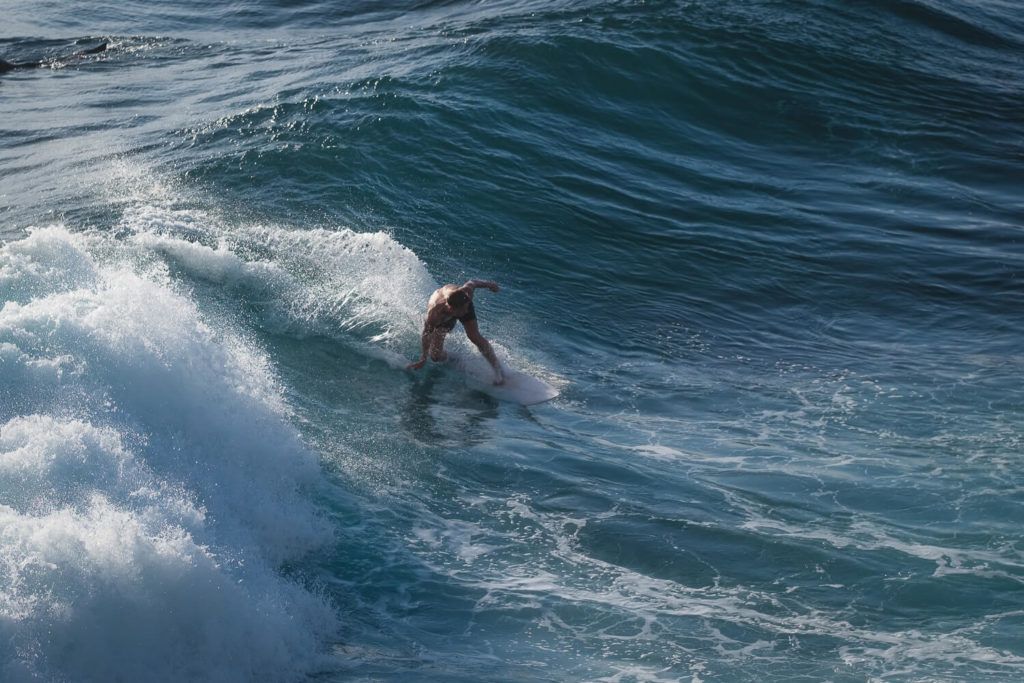
Photo: Roaming Ralph
Just as the first wave of tourists arrives in the second half of June, they tend to leave in the second half of September. Prices follow suit, trending down as the month draws to a close.
The Festas do Sítio Nazaré, the Festival Flamenco Lagos, and many more all take place in September. If you don’t mind some crowds and mid-range prices, September is arguably the best month to visit Portugal.
October in Portugal
- Average Max. Temperature: 21.7°C, 71°F
- Rainfall: 7 days
Portugal’s weather in October is comparable to the weather in May. Though there’s lots of sun, there are also a few more rainy days, and it’s just slightly too chilly for the beach. If you’re like me though, 22°C or 71°F and sunny sounds like a dream!
Crowds majorly thin out by this point, and prices drop accordingly. When you pair this info with the lovely weather, it becomes obvious why I have October listed as one of the best months to visit Portugal.
Head to the Algarve region in October, where you can watch winemaking and taste some of Portugal’s most famous wines, including Lagos, Lagoa, Tavira, and Portimão.
November in Portugal
- Average Max. Temperature: 17°C, 62.5°F
- Rainfall: 8 days
Portugal never gets cold cold, and so even as winter begins, you should be fine with just a light jacket on most days. It does rain a good amount in November, so make sure to pack an umbrella!
November is the start of the official low season, which means prices are headed toward rock bottom. Crowds are similarly sparse, so you and the locals will have even the major cities almost all to yourselves.
The famous Porto marathon kicks off in early November. If you’re feeling frisky, why not throw on some running shoes and give it a shot?
December in Portugal
- Average Max. Temperature: 14.6°C, 58.2°F
- Rainfall: 7 days
Portugal in December is quite chilly and rainy, even in the southernmost regions (and especially in the north!) Again though, “chilly” in Portugal isn’t actually all that chilly.
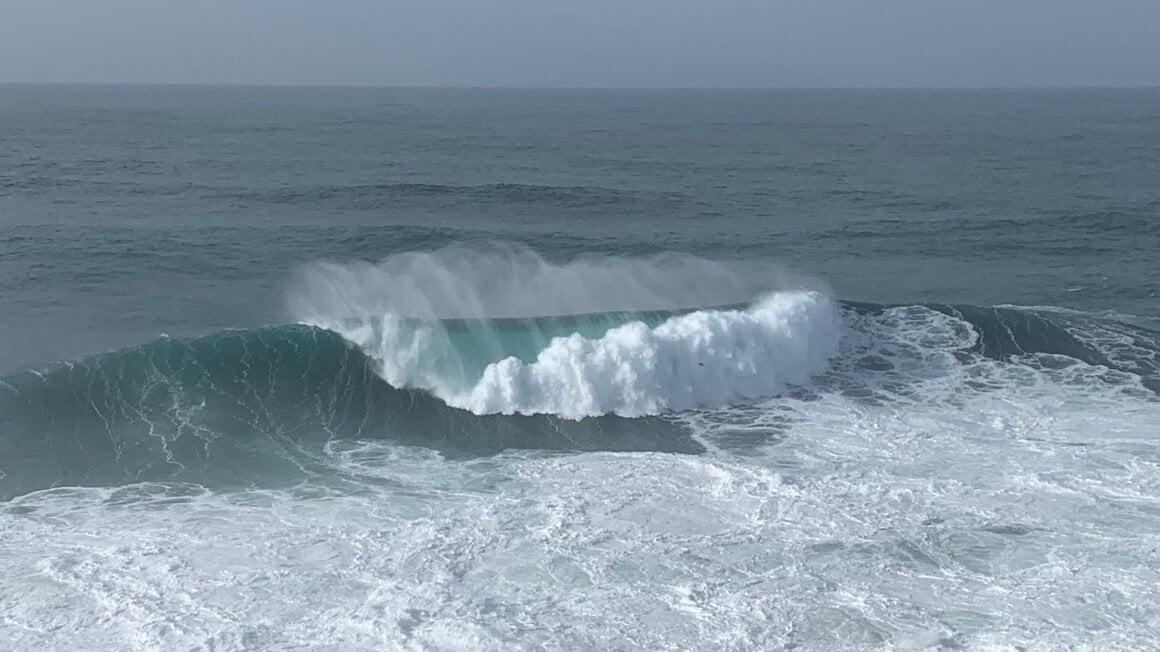
Photo: @joemiddlehurst
Prices really plunge in early December, even in the major cities, and tourist counts are at a minimum. That is, until the end of December.
What’s going on at the end of December in Portugal? Uhhh… CHRISTMAS! And not only Christmas—Portugal goes hard for New Year’s as well! If you don’t mind the slightly colder weather, the big cities are dreamy, with a charming festive vibe everywhere you look.

A new country, a new contract, a new piece of plastic – booooring. Instead, buy an eSIM!
An eSIM works just like an app: you buy it, you download it, and BOOM! You’re connected the minute you land. It’s that easy.
Is your phone eSIM ready? Read about how e-Sims work or click below to see one of the top eSIM providers on the market and ditch the plastic.
Grab an eSIM!Best Time to Visit Portugal by Place
Ok, so now let’s get into the best time to go to Portugal by place. I like this bit, hehe.
Best Time to Go to Lisbon
Portugal’s capital city of Lisbon has been around for 2,700 years, which means it was founded around 700 BC. So if you’re a history buff, this city is a goldmine. It’s also just spectacularly designed, with historical white buildings and stunning terra cotta roofs.
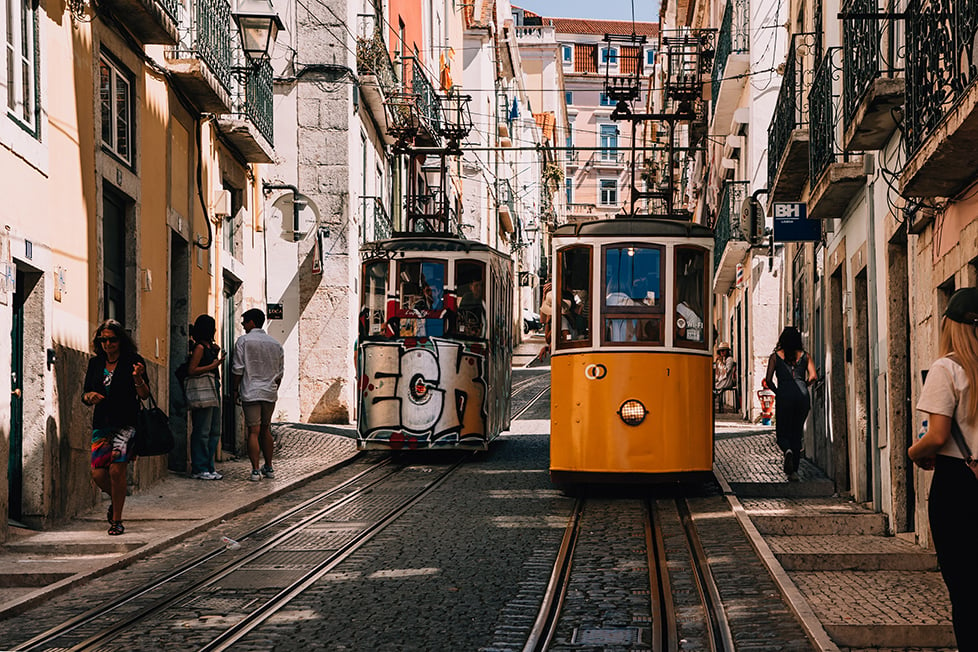
Photo: Nic Hilditch-Short
Must-sees in Lisbon include the famous São Jorge Castle, the Belém Tower, the Jerónimos Monastery, and the entire old fishing neighbourhood of Alfama, which is perhaps the most quintessentially “Lisbon” place in the whole city.
Weather-wise, you can’t go wrong in Lisbon from May–October. That said, Lisbon draws more tourists than any other place in the country. So whether you’re just visiting or backpacking around Lisbon and are looking for decent weather and tiny queues, visit in April or November. For slightly bigger crowds but perfect weather, May and October are your best bets.
Best Time to Go to Porto
Have you ever had port wine? Yeah, well, the reason it’s called “port” wine is because it originally came from the city of Porto. That alone should tell you that this city is home to some of the best cuisine in the whole continent.
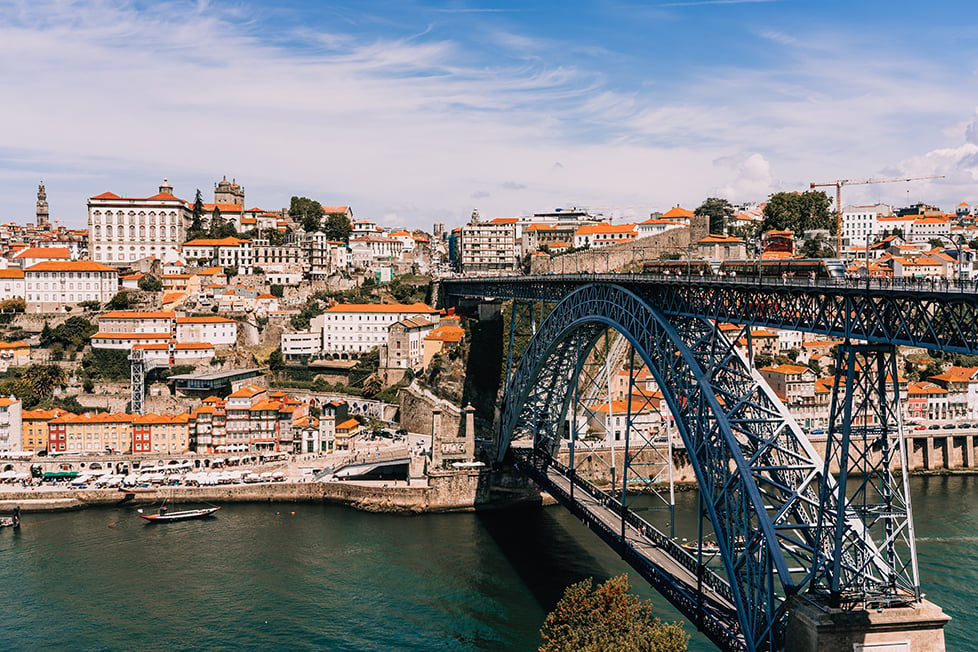
Image: Nic Hilditch-Short
Aside from food and drink, Porto, like Lisbon, has a rich history. You’ll find no shortage of stunning churches, gorgeous architecture, and actually some pretty amazing beaches, enough for a jam-packed Porto travel itinerary for sure! Many people don’t know that in 1996, the city centre of Porto officially became a UNESCO World Heritage site.
Since Porto is closer to the north of Portugal, it’s generally a bit colder than Lisbon and the Algarve. I recommend visiting in May, June, or September.
If you don’t mind more tourists, the second half of August is doable as well. Why these months? Well, the weather is divine, but tourist counts have dwindled considerably from their high-season peaks.
Best Time to Go to the Algarve
The Algarve, also known as the Faro District, is the very southernmost section of Portugal. If you Google Image it, you’ll see what looks pretty close to paradise: turquoise-blue seawater and pristine white sand beaches backed by high cliffs and historical seaside villages.
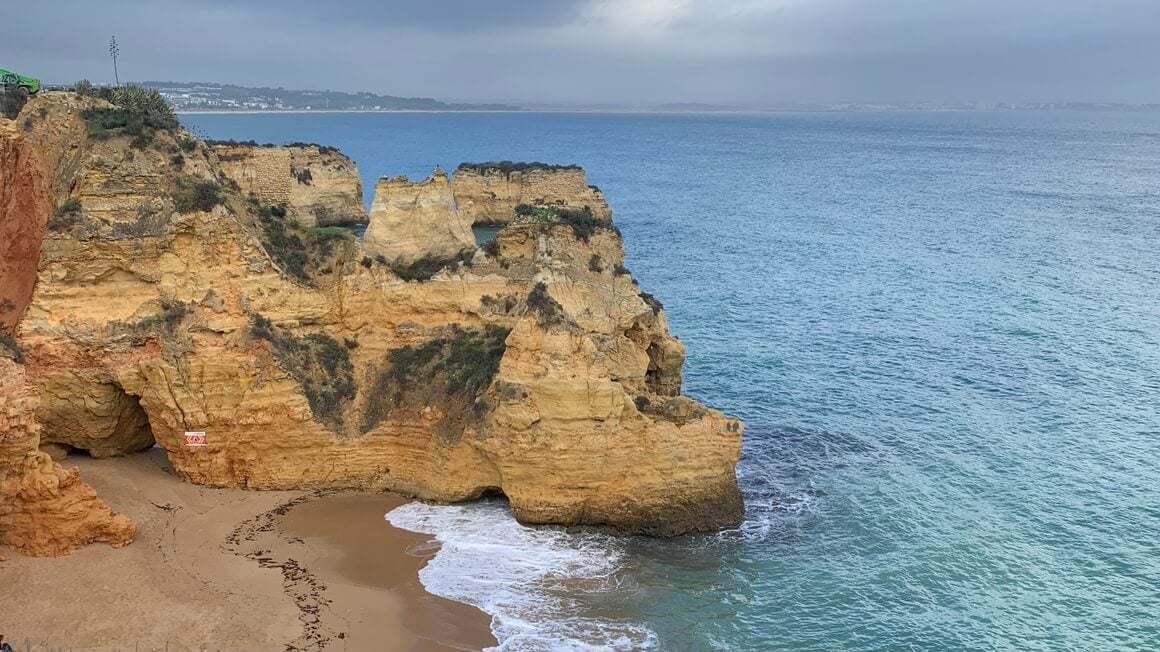
Photo: @joemiddlehurst
So yeah, if you’re planning on staying in the Algarve, bring a beach towel, some sunscreen, and definitely a good quality surfboard; the Algarve is known as one of Europe’s finest surf spots. The whole region is also dotted with a number of gorgeous golf resorts, so if that’s your thing, get over here ASAP!
The unfortunate truth here is that the best time to visit the Algarve is right smack in the middle of the high season: June, July, and August. If you want optimal beach weather and you don’t want to be cold, there’s just no way around this. You could try and visit at the end of May or at the beginning of September if you really can’t deal with crowds—but I can’t guarantee the weather will be warm enough for swimming.
Best Time to Go to Madeira
Madeira is becoming more and more popular as the years go by, but it’s still a wonderfully well-kept secret of which many tourists are completely ignorant. Madeira is characterized by two of my favourite things in the world, right next to each other: mountains and the ocean. Lush, green peaks and cliffs descend sharply down towards one of the bluest oceans your eyes may ever behold.
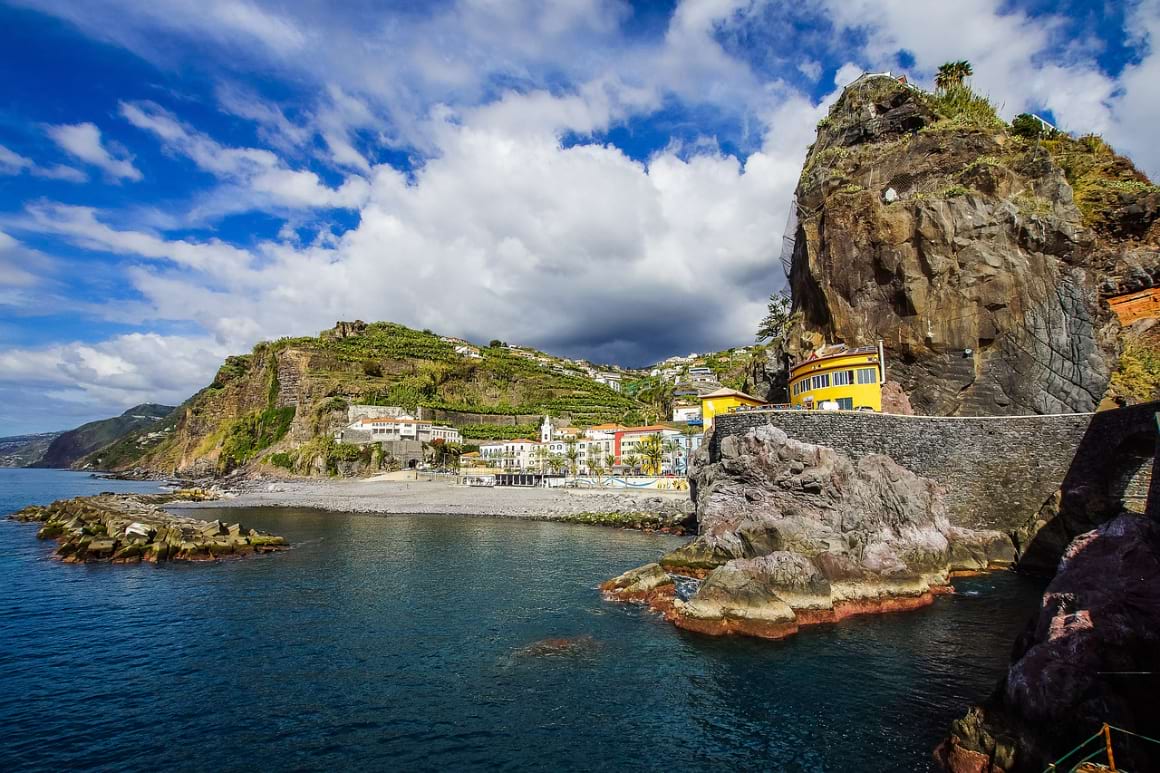
Activities in Madeira include but are not limited to surfing, beach-bumming, and, most notably, some amazing hikes! The island is known for its unbelievable wine, which is so spectacular that the Founding Fathers of the United States toasted with it when they signed the Declaration of Independence.
Most tourists visit Madeira in July and August. Like the Algarve region, these high-season months are arguably the best for beach weather. However, the September weather in Madeira is still absolutely magical, and there are fewer tourists, making September my personal recommendation for when to visit the island.

Stash your cash safely with this money belt. It will keep your valuables safely concealed, no matter where you go.
It looks exactly like a normal belt except for a SECRET interior pocket perfectly designed to hide a wad of cash, a passport photocopy or anything else you may wish to hide. Never get caught with your pants down again! (Unless you want to…)
Hide Yo’ Money!Best Time to Visit Portugal for Parties and Festivals
Let’s be clear about one thing: the Portuguese know how to have a good time. To be honest, the festival culture here is so rich that you would be remiss if you visited the country and didn’t experience at least one celebration.

There are festivals and parties in Portugal throughout literally the entire year—so it’s hard to go wrong.
Here are the best festivals in Portugal to check out:
- Carnaval: Taking place at the end of February in the Torres Vedras neighbourhood of Lisbon, Carnaval is perhaps the most distinctly Portuguese festival. It’s essentially the last chance to go crazy and party before Lent. There’s dancing, music, and some outrageous costumes.
- Primavera Sound: This is one of Portugal’s biggest music festivals, annually featuring some of the world’s biggest names in music. It’s held in Parque da Cidade, Porto, in early June.
- Iberian Mask Festival: Spanning four days during the first week of May, the Iberian Mask Festival is a celebration of unity between the Portuguese and Spanish. It’s called the “mask” festival for a reason: you can expect positively wild costumes, along with thumping drums and loud music all over the streets of Lisbon.
- Semana Santa: Holy Week, celebrated at the end of March, is a big deal in Portugal. Many old traditions are performed, such as the Archbishop’s washing of 12 people’s feet, and classic Portuguese foods are on offer everywhere. Culminating on Easter Day, Holy Week in Portugal is celebrated everywhere, but the cities of Braga and Loulé celebrate it most strikingly.
Of course, it goes without saying, the whole country spares no expense for the traditional holidays of Christmas and New Year’s as well.
FAQs About the Best Time to Visit Portugal
Here are some common questions from broke backpackers like you about the best time to visit Portugal.
Don’t Forget Your Portugal Travel Insurance
Wherever you travel, insurance is needed. No ifs or buts about it. Get some good cover to protect yourself and your belongings.
ALWAYS sort out your backpacker insurance before your trip. There’s plenty to choose from in that department, but a good place to start is Safety Wing.
They offer month-to-month payments, no lock-in contracts, and require absolutely no itineraries: that’s the exact kind of insurance long-term travellers and digital nomads need.
SafetyWing is cheap, easy, and admin-free: just sign up lickety-split so you can get back to it!
Click the button below to learn more about SafetyWing’s setup or read our insider review for the full tasty scoop.
Final Thoughts on the Best Time to Visit Portugal
If you still don’t know when you want to visit Portugal, I don’t know what to tell you.
For the warmest weather but the biggest crowds, visit during the high season. (Just don’t forget to book your accommodations in advance!)
Looking for the best deals and the smallest crowds? Visit during the winter. For the best of both worlds, visit in late spring/summer or autumn.
Portugal has something for everyone. Whether you’re a surfer, a trekker, a history geek, or a city sleeker, you will never be bored in this spectacular country. And for the icing on the cake, it’s the cheapest country to travel in Western Europe.
So brush up on your Portuguese and get going!
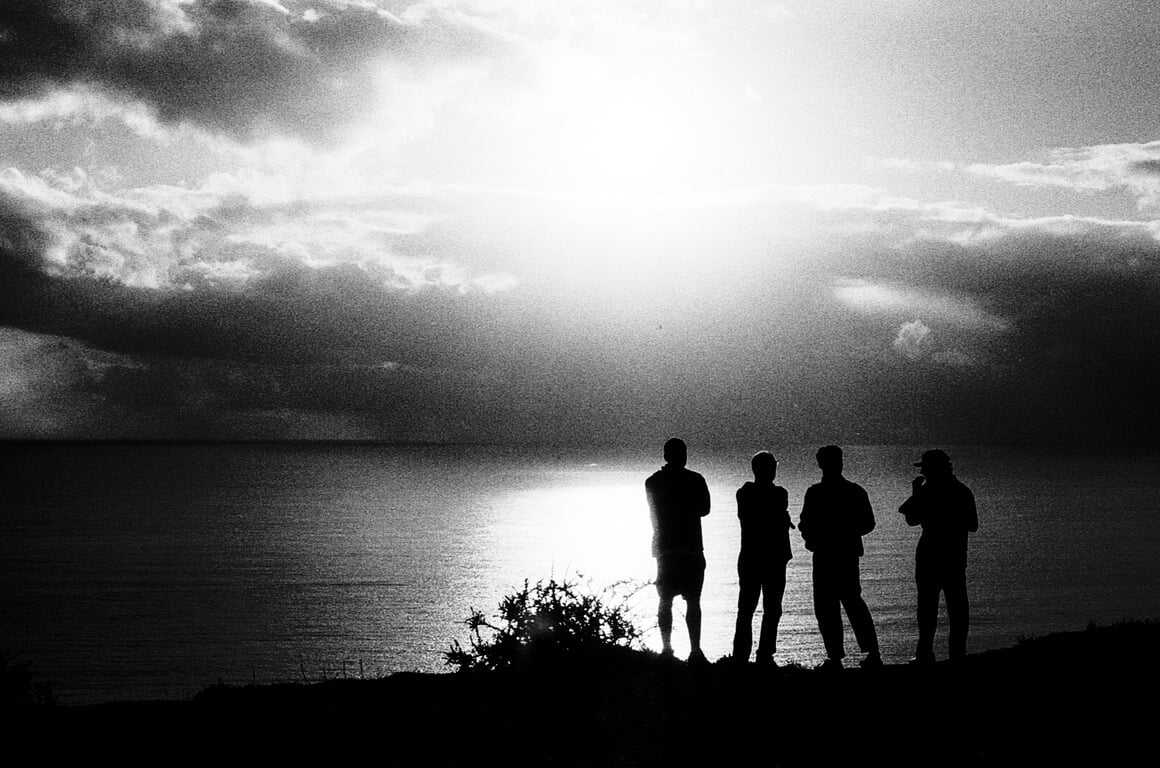
Photo: @bg_analog.photo

And for transparency’s sake, please know that some of the links in our content are affiliate links. That means that if you book your accommodation, buy your gear, or sort your insurance through our link, we earn a small commission (at no extra cost to you). That said, we only link to the gear we trust and never recommend services we don’t believe are up to scratch. Again, thank you!






